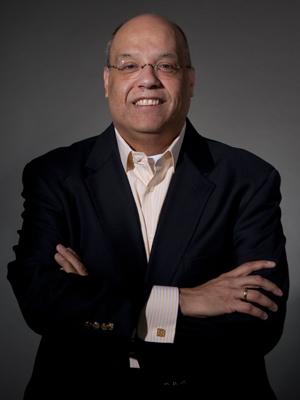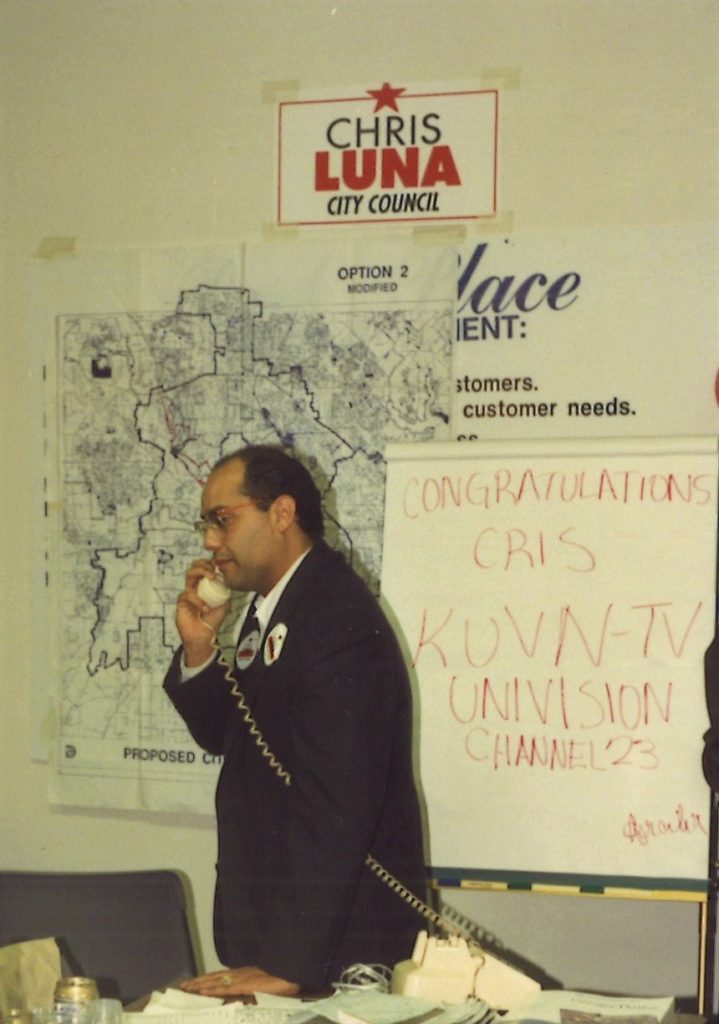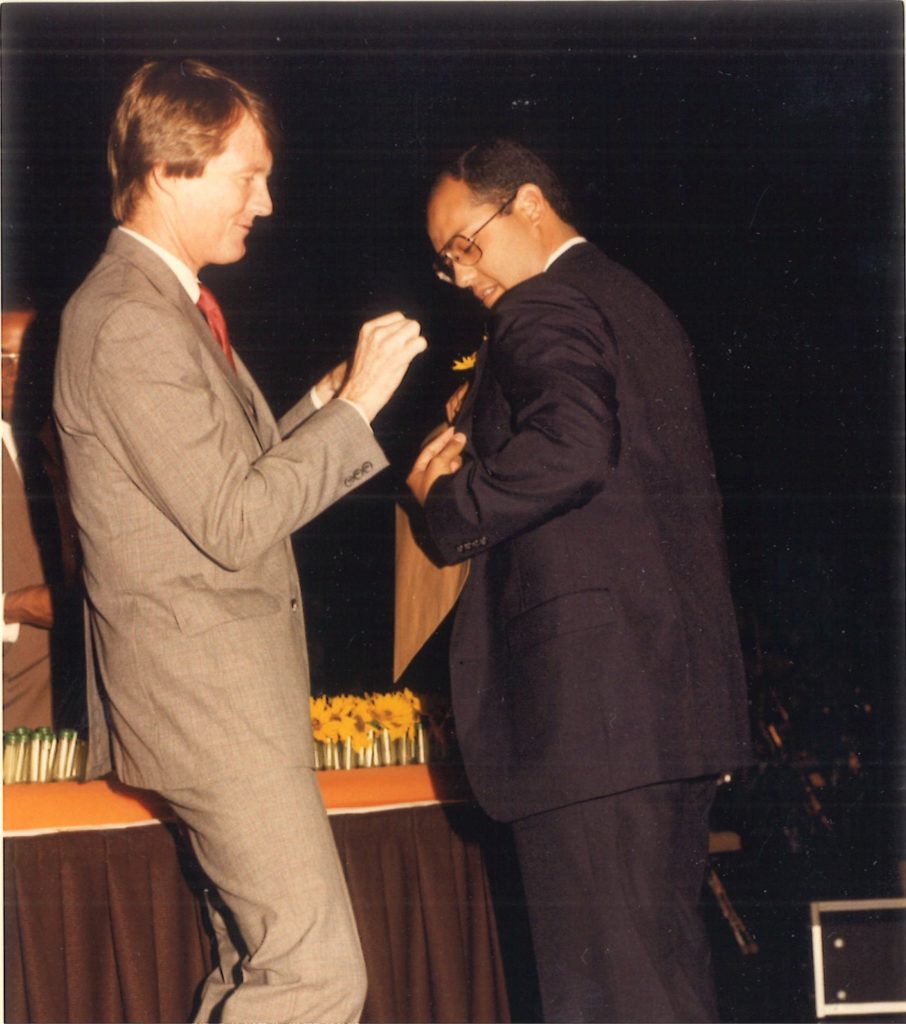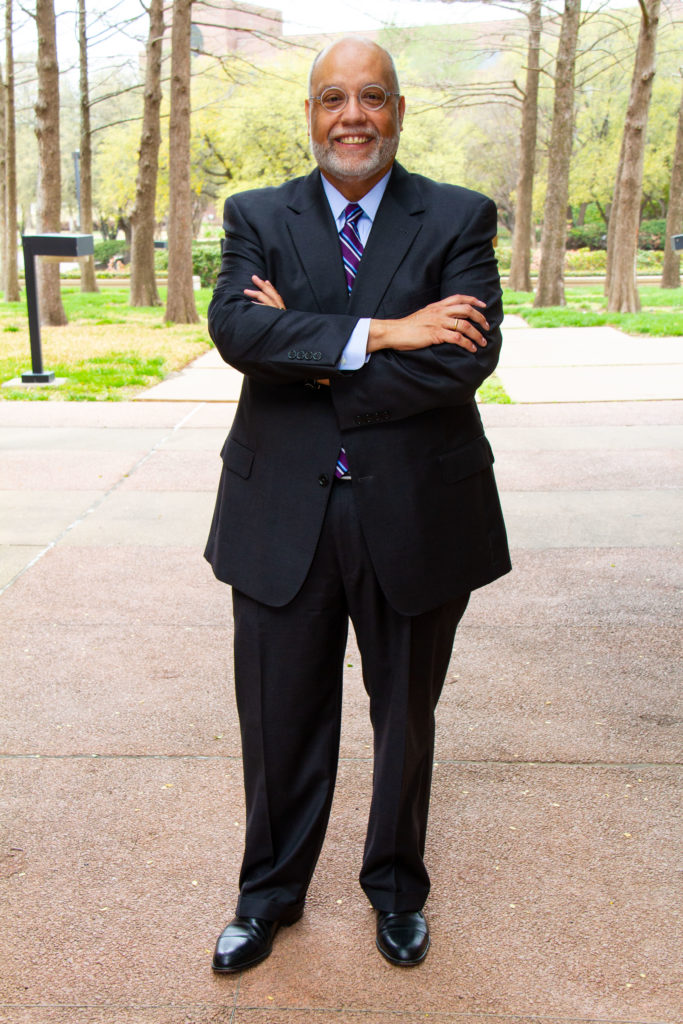
Chris Luna was a 30-year-old bankruptcy lawyer at Akin Gump in 1991 when he first approach firm leader Alan Feld about running for Dallas City Council.
“Sure,” Feld responded, “take a few months off to run and get it out of your system. Then come back to work and all will be forgiven.”
Luna ran in a new district created when U.S. District Judge Jerry Buckmeyer declared Dallas’ method of electing its representatives at large violated the federal Voting Rights Act.
In November 1991, Luna and his supporters gathered at his campaign headquarters in Oak Lawn to watch election returns. At first, the news was not good, as Luna trailed in early vote counts.
“The mood was getting somber,” he says. “So, I walked down to a 7-11 a couple of blocks away to get some fresh air and collect my thoughts. I was thinking about what to say in my concession speech to my supporters, friends and families. The common wisdom throughout the campaign was that I was going to lose the election.”
When he returned to the campaign office, the vote count had changed. Luna won by 156 votes – one of the closest election victories in Dallas history.
Supporters gave him a new nickname: “Landslide Luna.”
Now chief counsel and vice president of legal affairs for Metro by T-Mobile, Luna is one of the leading and most influential voices in the Texas corporate legal community.
During his three-and-a-half-decade career, Luna has won some spectacular successes.

He scored several remarkable achievements as a public servant – he diligently brought much-needed attention and dollars to long-neglected minority neighborhoods, successfully advocated for the adoption of a nondiscrimination policy for city employees, pushed for the construction of the Grauwyler Recreation Center on Harry Hines Boulevard, aggressively supported the building of the American Airlines Center and was elected the city’s first Hispanic deputy mayor pro tem.
In the private sector, Luna played a critical in-house role in several major corporate transactions, including the $631 million sale of Allegiance Communications to XO Communications in 2004, MetroPSC’s $1.15 billion initial public offering in 2007 and MetroPCS’s $1.5 billion sale to T-Mobile in 2012.
And Luna has used his position as chief counsel for Metro by T-Mobile to tirelessly advocate for Hispanics in the legal and business communities. He has helped raise hundreds of thousands of dollars for Latinos to go to college and law school.
For these reasons and so many more, the Association of Corporate Counsel’s DFW Chapter and The Texas Lawbook are honored to give the 2019 Outstanding Corporate Counsel Award for Lifetime Achievement to John Christopher Luna.
“I have been privileged to have a wonderful and supportive family, a great education and to work in a noble profession,” says Luna, who is 59. “I have loved the opportunity to be involved in some great legal projects, to work alongside some amazing and talented lawyers and to give back to the public. And I’m not through yet.”
But he adds, “I know when people call me and ask for John, they really don’t know me.”
Lawyers who work with Luna are uniform in their praise.
“Obviously, he’s whip-smart, but also very practical,” says Debra Witter, a partner at Farrow-Gillespie Heath Witter in Dallas. “His focus is always on meeting his internal clients’ goals while protecting the enterprise. Chris’s approach is ‘How do we get to yes?’ rather than ‘No, unless you can convince me otherwise.’
“Chris has the heart of a servant leader, and this informs how he practices law and conducts business,” Witter says. “He is unfailingly kind.”
Kenneth Florin, chairman of New York-based Loeb & Loeb, agrees.
“I think the pragmatism and collaborative style Chris brings to his position makes him especially effective in his role,” Florin says. “He’s also especially creative and solution-oriented.”
“Chris has consistently been an advocate and supporter of diversity and inclusion. Advancement in these areas is important to him personally and professionally, and that deep commitment is something that distinguishes Chris,” Florin says.
Born and raised in Houston, Luna is the second youngest of eight children. His father, who served in the U.S. Army in North Africa, was an oil and gas engineer. His mother was a registered nurse. They were first-generation Mexican Americans who were the first in their respective families to graduate from high school and college.
“My parents believed education was the great equalizer,” says Luna, who has two siblings who are public school teachers, two who are engineers, one is a high school administrator, one has an MBA and one is a lawyer.

As a teenager, Luna listened to stories from his older brother, Charles Stephen Luna, who was then a student at Harvard Law School. His brother later joined the Exxon Mobil corporate legal department as an environmental lawyer.
“My brother would tell law stories, and I would sit and listen and be fascinated,” he says.
Luna received an accounting degree from the University of Texas in 1983 and his law degree from UT in 1986.
U.S. Chief Bankruptcy Judge Robert McGuire hired Luna as a law clerk in 1986, when the Texas real estate market was tanking and the savings and loan crisis was hitting full force.
“It was like we were drinking from a fire hose,” he says. “I learned so much from Judge McGuire.”
In 1987, Luna joined the Dallas office of Akin Gump in its corporate restructuring and reorganization practice.
“I never thought I work for a large corporate law firm, but my years at Akin Gump were incredible,” he says. “I learned so much from the partners at the firm and our clients.”
Luna worked on eight bankruptcy and restructuring matters that resulted in published opinions.
In 1990, he argued a case to the U.S. Court of Appeals for the Fifth Circuit to let his client move forward with a restructuring plan to sell off some assets and use the proceeds to pay off and restructure its debt. The plan also redistributed partnership interests in the business based on actual capital contributions. The Fifth Circuit ruled in Luna’s favor.
“I like to tell my appellate law friends that I am undefeated in arguing cases at the Fifth Circuit,” he says. “Hey, 1-0 is still undefeated.”
Then came Luna’s decision to run for a seat on the Dallas City Council in 1991.
“In a perfect world, I would have waited a few years to run for office so I could get more experience as a practicing lawyer,” he says. “But the opportunity was there, presenting itself at that moment.”
The “opportunity” was the 1990 federal court ruling that Dallas’ at-large city council voting districts violated the federal Voting Right Act because it diluted minority voting power.
“Many Dallas neighborhoods had been neglected and overlooked for basic and essential needs and improvements,” he says. “These neighborhoods also happened to be where many minorities lived.”
Luna’s district was L-shaped, starting at Love Field, stretching down Maple Avenue, into the West End and then to Deep Ellum and East Dallas.
During his time on the city council, Luna was directly involved in the appointment of more than two-dozen board members to critical seats on important local commissions and agencies.
“For the first time, the people appointed to these boards actually looked like the people who lived in our city,” he says. “Diversity is so important.”
In 1993, the Dallas City Council voted 11-3 to establish goals for hiring construction companies that promoted diversity in their hiring practices – a measure Luna helped develop and push. A year later, again with Luna’s aggressive advocacy, the council approved a resolution that the city would only use law firms that had a solid commitment to hiring minority lawyers.
Public service, according to Luna, is something every lawyer and business leader should consider.
“I believe that if exceptional people only do business or law or medicine, then government becomes the lowest common denominator,” he told Hispanic Executive magazine in an interview in 2019. “It is possible to be successful and do public service.”
Luna said his years on the Dallas City Council, which employed 12,000 people and sported an annual budget of $1.2 billion, taught him about managing a large organization.
In 1997, Luna returned to the private sector and started his own law firm. A year later, he agreed to become the general counsel of Tri-City Health Centre, a community hospital in Pleasant Grove.
“The hospital was having financial troubles and the board knew that bankruptcy was a possibility,” he says. “We developed a plan and went into bankruptcy and got the court to approve the restructuring. Unfortunately, the Tri-City still ended up failing a couple of years later.”
Allegiance Telecom General Counsel Mark Stachiw called Luna about joining the company’s legal department in 2002.
“Mark explained that the company was facing financial troubles and was considering bankruptcy,” Luna says. “Mark told me that if I do a good job, I would work my way out of a job, which is exactly what happened.”

Allegiance filed for Chapter 11 restructuring. As part of its reorganization, XO Communications agreed to purchase Allegiance for $631 million in cash and stock in 2004.
Stachiw joined MetroPCS in 2005 and immediately called his trusted friend Chris Luna to join him as his deputy GC.
Luna immediately started working on a $739 million investment in MetroPCS by two private equity firms, Madison Dearborn Partners and TA Associates. Two years later, he also worked on MetroPCS’s $1.15 billion IPO.
“I had never been involved in an IPO, so this was a tremendous experience for me,” he says.
Luna helped manage outside counsel and worked on regulatory filings and due diligence.
The result was extraordinary growth for the prepaid cellphone company over the years that followed, doubling its revenues and tripling its workforce.
MetroPCS was experiencing so much success that Sprint came calling, seeking to buy the Dallas-based company. Lawyers on both sides worked day and night to negotiate the terms, do the necessary due diligence and start work on regulatory approval.
The MetroPCS board approved the deal. The transaction was set to close in 2012 when the Sprint board of directors unexpectedly declined to approve the acquisition.
“We were flabbergasted, as the vote seemed to come out of nowhere,” Luna says. “There were several points along the way, but there were never any red flags. It was a depressing situation, but it quickly ended up being the best thing that could have happened for the company.”
Six months later, T-Mobile initiated discussions with MetroPCS. Negotiations moved smoothly and quickly. In early 2013, T-Mobile agreed to pay $1.5 billion to acquire its rival.
In the six years since the transaction, Metro has more than doubled its customer base and more than doubled its retail locations. The Metro division of T-Mobile has more than $8 billion in annual revenues, according to new media reports.
“Chris has tremendous understanding of the wireless retail landscape and combines that with his sharp legal knowledge to proactively direct our contractual and partnership efforts,” says T-Mobile Executive Vice President Thomas Keys, who worked with Luna for many years.
“Chris can maneuver ‘from the boardroom to the bar room’ as the expression goes,” Keys says. “He has a high degree of ‘social intelligence’ that allows him adapt well in a wide range of professional and social situations.”
Keys and others say Luna’s commitment to issues such as pro bono, public service and diversity are unparalleled.
“Chris is truly committed to the community where he lives, works and plays,” Keys says. “He is generous with his time outside of work and is the first one to volunteer his time for others. People seek out his counsel on a continuous basis. Chris is genuine, caring and extremely humble. He listens well as he helps people with their issues. He really is a very good person.”
Luna is now chief counsel and vice president of legal affairs for the company. He leads a legal team of three in-house lawyers and three outside counsel who basically work full time for Metro by T-Mobile.
One thing is for sure: Luna is not afraid to use his position to push law firms to improve their diversity numbers.
“Law firm diversity initiatives are great, but many law firm leaders have mastered the talk but do not walk the walk,” he says. “The aggregate number of minority lawyers has gotten a little better, but the percentage of lawyers of color has not improved.
“In fact, we have actually seen a regression in recent years,” he says. “I think there is a diversity lethargy that has seeped into law firms.”
Luna’s own pointed experience with the lack of diversity in the legal profession came when he was a law student attending a law firm reception.
The wife of a partner turned to Luna, handed him her glass and asked for more wine.
“Because I looked more like the hired help than a second-year law student that the firm was recruiting, the woman thought I was a waiter,” he says. “The partner got very embarrassed, even though it wasn’t his fault.
“There were so few lawyers of color back then,” he says. “While there are many more of us today, the number of minority corporate lawyers remains woefully low.”
Luna is actively involved in several community efforts aimed to increase diversity with a focus on populating the pipeline. He serves on the T-Mobile Legal Diversity Task Force and is a member of the company’s Corporate Responsibility Advisory Council. He also is a senior leader of the Dallas Hispanic Law Foundation and aggressively raises funds for minority scholarships.
Nor is Luna shy about leveraging his leadership position at MetroPCS to promote diversity. He says he has stopped using law firms that do not take diversity seriously.
“Corporate legal departments need to hold accountable the law firms they hire,” he says. “I’m a firm believer that we need to use carrots and sticks to push law firms to be more aggressive about diversity.
“My mother used to say that ‘we should be givers, not takers.’ That was right back then and it is right today,” he says.
